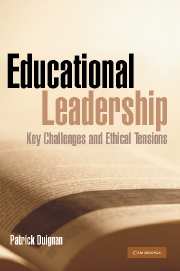Book contents
- Frontmatter
- Contents
- Acknowledgements
- Introduction and overview
- 1 Contemporary leaders and leadership under the spotlight
- 2 Key challenges for educational leaders
- 3 Leadership challenges as tensions
- 4 A framework for analysing tensions
- 5 Values and ethics in decision-making
- 6 A method for ethical decision-making
- 7 Shared and distributed leadership in schools
- 8 Why we need capable educational leaders
- 9 Why we need authentic educational leaders
- 10 Forming capable and authentic educational leaders
- References
- Index
1 - Contemporary leaders and leadership under the spotlight
Published online by Cambridge University Press: 05 June 2012
- Frontmatter
- Contents
- Acknowledgements
- Introduction and overview
- 1 Contemporary leaders and leadership under the spotlight
- 2 Key challenges for educational leaders
- 3 Leadership challenges as tensions
- 4 A framework for analysing tensions
- 5 Values and ethics in decision-making
- 6 A method for ethical decision-making
- 7 Shared and distributed leadership in schools
- 8 Why we need capable educational leaders
- 9 Why we need authentic educational leaders
- 10 Forming capable and authentic educational leaders
- References
- Index
Summary
In this chapter I will examine aspects of the environments within which educational leaders operate. These environments are extremely complex and would require a whole book to do them justice. For the purposes of this book, with its primary focus on ethical and moral leadership, I will examine selected aspects of these environments, which I suggest may impact on the way in which educational leaders exercise their choices and make their decisions.
Educational leaders live and work in a global world that, according to Giddens (1998), influences social processes and institutions and encourages new forms of individualism that contribute to more selfish modes of living. Slavish commitment to individualised ways of living can generate addictions, especially process addictions, that are so pervasive that we may not even be aware of them. A disturbing implication of these process addictions is that they start very early in life and schools may wittingly or unwittingly encourage them in students. In a century characterised by enormous choices, it would be somewhat ironic if schools prepared students more for addiction than for choice.
Educational leaders and teachers have a particular responsibility to ensure that students in their care receive the type of education and learning experiences that help transform their lives so that they can break the bonds imposed by forces for ‘intense individualism’ (Sommerville, 2000) and better contribute, as responsible citizens, to the common good.
- Type
- Chapter
- Information
- Educational LeadershipKey Challenges and Ethical Tensions, pp. 6 - 20Publisher: Cambridge University PressPrint publication year: 2007



